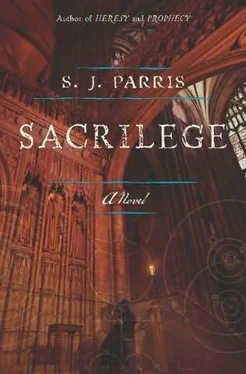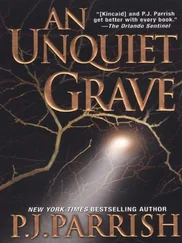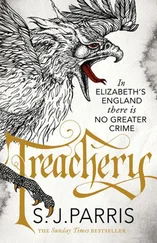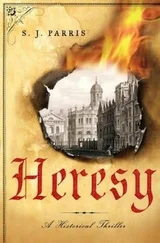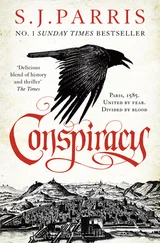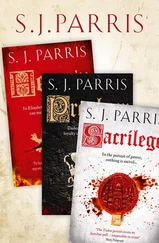“The account books are all in the treasury, of course,” Langworth was explaining to the dean, his voice growing defensive. “I was on my way over there.”
“Then I shall accompany you,” the dean said, just as pleasantly. “Shall we go now?”
Langworth hesitated.
“Of course. Although I realise I have left my keys in my chamber—do go on ahead, if you wish.”
“No matter,” said the dean pleasantly. “I can wait a moment.”
Langworth’s heavy footsteps sounded again on the stairs; I scrambled back under the bed, my heart pounding in my throat, pressing a hand over my mouth as the dust scuffed up by my sudden movement itched its way into my eyes and nose. The counterpane that hung over the bed was still swaying when Langworth stormed into the room, unlocked the hidden door, threw the packet he had left on the bed into the back room, and locked the door again, muttering under his breath. I heard the flap of heavy material as he rearranged the tapestry and the metallic clink of the keys as he tossed them in his hand on his way out. Though I had fallen out of the habit of regular prayer, I offered a silent thanks to Providence for the appearance of the dean.
When I was certain that they had left the house, I crawled out from my hiding place, brushing the dust from my clothes, and crept back down to the study, again bending low so that I would not be visible to anyone passing the window. I hesitated by the desk as I replaced the penknife, first wiping the traces of my blood from its blade. There was ink in the inkwell, and paper. How long was Langworth likely to be in the treasury with the dean—long enough for me to copy the letter I had tucked into my purse? My hands were still trembling from our near-encounter. I forced myself to breathe slowly and deeply. Now that I knew Langworth and the other canons would be occupied at the chapter meeting that afternoon, I decided the lesser risk would be to take the letter away to copy and attempt to return the original later while he was out, trusting that he would not check the contents of his secret chest carefully in the meantime.
Outside, the sound of voices carried across from the cathedral. People were evidently abroad in the precincts; the service must have ended. I needed to leave Langworth’s house now, while I still had time; Harry would be expecting me for dinner soon and I wanted to return to the Cheker and copy the coded letter first—though I had no idea how I could send it to London, now that I knew Samuel could not be trusted. My jaw tightened at the thought of dissembling in front of Harry’s servant, as if I were ignorant of his treachery. I must find a way to speak to Harry alone, I thought, but I feared he would not believe me about Samuel, and I would lose his trust and goodwill if he knew I had defied his warning to keep away from Langworth. Worse still—and my mouth dried at the thought—I could not discount the possibility that Harry knew about Samuel. Perhaps he was even in league with Langworth, or at best turning a blind eye; it would not be the first time one of Walsingham’s contacts had betrayed his trust and, though I found it hard to believe of Harry Robinson, I knew I must remain wary. The hardest part of working for Walsingham was knowing whom to trust.
I cast a last glance over the desk and as I did so, it was as if something distant echoed in my brain, an instinct that prompted me to take a second look. I picked up the first of the papers—a balance sheet, with columns of numbers, scribbled calculations beneath. Under a couple of pages of similar notes, I found another sheet itemising expenditure for the month of May 1584, an unremarkable list of outgoings for a cathedral foundation: Alms; Bread; Candles; Dean’s kitchen; Eucharist (sundries)… I stared at the paper; something seemed odd about it. I almost laughed aloud as the realisation dawned. The list was alphabetical, and beside each item listed was a figure, set out as the number of shillings and pence paid. Could it be …? Where better to hide a cipher based on the substitution of numbers for letters than among balance sheets? Holding my breath, glancing all the time at the window, I took the stolen letter from my purse and checked the numbers at the top of the page: 1271584 76201536.
Matching the numbers against the figures in the expenses column, I tried to make sense of the first set, but no matter how I divided the numbers up, there was no combination of letters that made any sense. Frustrated, I bit my lip; I had been so certain of my sudden flash of insight. I tried the next long number. Seven … the only item on the list beginning with 7 was “Parish priests—7s 6d.” Seven and six—P. “Alms” was listed as twenty shillings, but there was no payment corresponding to fifteen, or one-and-five. I cursed under my breath and glared at the list as if to intimidate it into giving up its secrets. It seemed my imagination had overreached; this was nothing but an ordinary accounting sheet and I was being a fool. I was about to replace it when I noticed that “Incense” was set down at five shillings. Incense? Though I was not well versed in the theological disputes of the English church, I knew that the use of incense was a vexed question; some thought it too close to the ornaments of the Church of Rome, while others argued that it had never been explicitly prohibited and was therefore acceptable in Protestant services. I had not noticed any smell of incense on either of the occasions when I was inside the cathedral, so its inclusion on the list of outgoings struck me as odd. I scanned back over the list to see if anything corresponded to the number 1, and realised that I had overlooked “Repairs (sundries),” listed at one pound. That gave us P-A-R-I … Heart racing, I searched the list and found what I had hardly dared hope for—the payment for “Scholars” was 3s 6d. So if I was right, and this balance sheet was indeed the cipher, the second word at the top of this letter was “Paris.” What, then, was the first? I began again, cursing when every combination I matched against the balance sheet resulted in no recognisable word. I blinked slowly and tried to look at the numbers with fresh eyes, until I realised with a start that the last four numbers made sense together as a group: 1584. This first group of numbers, then, was not a word but a date—the twelfth of the seventh, 1584. A letter sent from Paris on 12 July—my instinct was right. In haste, I scrabbled on Langworth’s desk for a new sheet of paper and dipped his quill in the inkwell, hoping he would not notice it had been recently used. As quickly as I could, I copied the cipher, put my copy and the letter into my pouch again, and replaced the original balance sheet in the pile of papers, feeling triumphant. It was only then that I noticed I had been careless; a smear of blood from my cut finger marked the bottom of the cipher page. There was nothing I could do about it now, though, except to hope that he would not notice until much later.
I had to trust to luck in climbing out of Langworth’s back window, but fortunately no one passed along the path while I was making my escape and I emerged from behind the row of houses unobserved, as far as I could tell. The air felt thick and heavy with humidity and the blue of the sky had grown hazy with a thin gauze of cloud. Samuel was right, I thought; it seemed we would have a storm soon. I decided to take the letter I had borrowed from Langworth back to my room at the Cheker, make the copy, and decipher it as quickly as possible. I recalled Sophia mentioning that the Huguenot weavers travelled regularly to London to sell their cloth; perhaps one of them could be persuaded to take a letter to Sidney for a fee.
In the privacy of my chamber at the inn, with the door firmly locked against the solicitous attentions of the landlady, I sat on the low bed, my legs crossed under me, hunched over a new sheet of paper with the letter and the cipher spread out before me, but when I applied myself to the first lines, I had another surprise. As I pressed on, it became clear that Langworth’s correspondent was writing to him in Spanish. This was curious in itself, given that it was dated from Paris, but as the sense slowly emerged from the mass of numbers like a picture appearing out of fog, I felt a smile stealing across my face as I guessed at the identity of the author. More than once I had to pause, wiping lines of sweat from my brow and shaking my head in disbelief at what I read.
Читать дальше
Конец ознакомительного отрывка
Купить книгу
